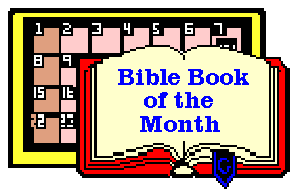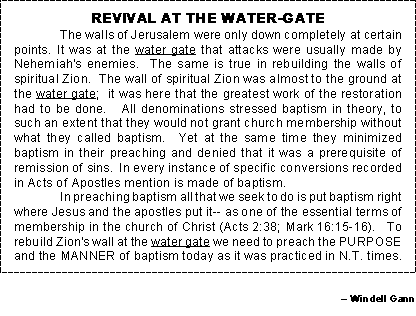

Lesson # 5
Revival At The Water Gate
A former governor in the course of a nominating speech before a political convention, paid an eloquent tribute to his candidate in these words: "It is my honor to nominate a man for your governor, who, when he was a little boy, always hoed to the end of the row." Nehemiah was a great man because he did what he set out to do; he did not stop until the walls of Jerusalem were rebuilt (6:15).
Nehemiah was not just concerned about "walls", but about God's people and their protection. He shows us that leaders are concerned about the spiritual growth and knowledge of the people in the Word of God.
We have already been introduced to Ezra. He was a "ready" priest and scribe before the Lord, a skilled teacher who returned to Jerusalem with Levite-teachers to "Rebuild the People." Here in the heart of the book of Nehemiah we run into him again, and as typical, he is teaching God's Word. We see how his work and that of Nehemiah's went hand in hand toward "restoring" God's people to the way of life God had given them. In face, many Bible scholars refer to this period of Bible history as "The Restoration Period."
1. The First Daily Vacation Bible School -- 8:1-18
On the first day of the seventh month (September) the people gathered in the open court before the Water Gate and asked Ezra to bring out to them the Word of God.
Picture in your mind, nearly all Israel congregating on the Feast Day of the Trumpets, and Ezra standing on a platform facing west from early morning till mid-day reading the Scriptures to the people and explaining it so they could understand it fully. Whether this meant he read it from the Hebrew and translated it into the Aramaic dialect which they used since the captivity, or whether he paused in the reading and "commented" and "explained" it, we're not sure. But the ASV says "And they read in the book, in the law of God, distinctly: and they gave the sense, so that they understood the reading."
a) We notice their attention. The assembly was composed of both "men and the women, and of those [children] that could understand." They listened attentively all morning as Ezra and others helped him with the reading and teaching.
b) We notice their reverence. When "Ezra opened the book in the sight of all the people...all the people stood up." In our mind we can see the reverent assembly rising to its feet in quiet reverence as God's Book is opened.
c) We notice the preparation. Apparently a platform had been built for this occasion so all the people could see and hear Ezra. It is appropriate to arrange the setting so God's Word can best be heard and taught.
d) We notice the participation. When Ezra praised God the people all the people answered "Amen, Amen!"
e) We notice the emotional experience. The people's response to the reading of the Scriptures and to Ezra's praises must have been an emotional experience for everyone present. Lifting their hands toward heaven they shouted "Amen! Amen!" in an expression of agreement with God's Word. Then they fell on their knees and bowed low as they worshipped the Lord (v.6).
2. Response to the study of God's Word -- 8:1-18
The sequence in chapter 8 is striking-- we see:
a) An intellectual response (v.1-8). The people were able to understand distinctly the word of the Lord and cried out in agreement to it.
b) An emotional response (v.9-12). As the people heard the Word they wept (v.9). Apparently they were remorseful over their past disobedience to the Law and contrite over their sins. Nehemiah, Ezra, and the Levites who helped with the teaching consoled the people and assured them this was not the time for weeping but the time for rejoicing.
c) An obedient response (v.13-18). Encouraged to give themselves to the keeping of the holy day the way it was intended they responded with gladness and feasting and giving of gifts to the poor.
On the second day when they gathered and gave attention to the reading
of the Scriptures they read how Moses gave instructions for the keeping of
the Feast of Tabernacles. This was one of the happiest celebrations of the
Jews. It involved the building of rough temporary shelters out of branches
and leafs on their house tops or in the open courts by the gates (v.16). This
reminded them how their ancestors had lived wandering in the wilderness.
It must have been great fun for the children, for it was like a "camp out" and a time for good eating (v.12) and happiness. A time of family togetherness, a "family retreat," Thanksgiving and Christmas rolled into one.
"And all the assembly of them that were come again out of the captivity made booths, and dwelt in the booths... And there was very great gladness. Also day by day, from the first day unto the last, he read in the book of the law of God. And they kept the feast seven days; and on the eighth day was a solemn assembly, according unto the ordinance" (8:17-18, ASV).
3. Their Covenant Renewed With God -- 9:1-4, 38: 10:1, 28-32
God's Word had a tremendous impact on the community. It pointed the people to their sin (8:9), led them to worship God (8:12, 14), and gave them great joy (8:17).
a) They confessed their sins -- 9:1-4. Fasting and wearing sackcloth with dirt on their heads they come before God and for three hours they read the Law. Then for another three hours they confessed their sins and worshipped the Lord.
Its so proper that in this book of Nehemiah, which has more reference to prayer and its place in the life of God's people, that we should also have the longest prayer in the Bible. In chapter 9 verses 5 - 38 we have the prayer of repentance and confession on the part of the people.
b) They promise to obey -- 9:38- 10:1, 28-32. The people not only resolved to repent and follow God but they committed their goals to writing and signed it. This served to remind them of the determination they had when they renewed their covenant with God. There is probably nothing as powerful in motivating one to keep his mind on his goal as putting it into writing and signing it.
(1) It commits us because we clearly see our goal.
(2) It prompts us to strive for the goal because others are aware of our commitments. It is public. See what Jesus says about public commitment in Matt 10:32,33.
The civil and religious leaders led the way signing to keep God's Word. The list begins with Nehemiah, who again set an excellent example for the people as their leader.
c) Cleaning Up Their Lives -- 10:28-32. Among the specific reforms they realize they need to make is:
(1) To separate themselves from intermarriage with the people of the land (vs.28-31). And that they would not give their sons and daughters to marry the heathens in the land. [Fathers and mothers today should strive and pray that our children will make wise choices for mates who will help them to be faithful in their service to God.]

(2) To pledge their support for the temple-- (v.32f) They would not let the temple fall into disrepair again by pledging to give one-third a shekel a year for its upkeep. Notice they pledged (or purposed -- 2 Cor. 9:7) to do this. This practice was still being kept in Jesus' day though inflation had raised it to a half-shekel (Matt.17:24-27).